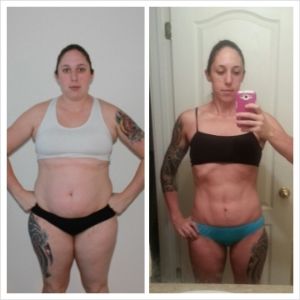So you want a nice stomach
Replies
-
There is none.0
-
-
To all the naysayers about cardio, I have found that doing 10-15 minutes or cardio everyday is just as good as doing 40 min to 2 hours everyday. This has been a lifesaver for me when I am going to school because I also have a full time job. I have lost nearly just as much weight doing a small amount of cardio everyday (and even sometimes skipping the weekend) as I did when I did more aerobic activity before school. It works! You HAVE to keep track of your food intake and the quality of what you are eating. I haven't tried weighing yet, but I'd like to. I've lost 2% body fat in a few months. The fat comes off little by little all around. It's amazing. I even lost 1.5 pounds during this past week when I was sick and not doing any kind of cardio or strength training, but I was still watching my food intake, and I was still eating the amount necessary for my body everyday.0
-
-
Thank you so much for your advice and for sharing your experience.0
-
What about stretch marks on the stomach, will those become less noticeable as you loose weight?0
-
soldiergrl_101 wrote: »What about stretch marks on the stomach, will those become less noticeable as you loose weight?
Stretch marks become less noticeable over time no matter what. Mine are still visible in person and they will be there forever. I still wear bikinis in public because I know that most people have stretch marks and I'm not ashamed of them anymore.1 -
Excellent advice!! Thank you so much for posting this! =D0
-
What about alcohol? Is it ok to have as long as I stay in my caloric deficit or should I give it up completely? Thanks!0
-
What about alcohol? Is it ok to have as long as I stay in my caloric deficit or should I give it up completely? Thanks!
Alcohol is fine. Just like cake or ice cream. Also, like other calorie dense foods, they aren't very filling. You may find that to stay on track week in and week out that giving up certain things or limiting them is necessary, especially if they cause you to go over (for instance, you plan on having one drink, but you end up having four every time).0 -
This content has been removed.
-
I have another question. After losing 70lbs 4 years ago and gaining most of it back is it possible to lose it again? The first time I lost I did medifast, which is basically a starvation diet, and then when I ate somewhat "normal" the weight came back very fast. Now I want to lose it again but this time do it in a healthy way. Why is it so much harder this time around? Thanks!0
-
Following.
0 -
Thank you for your advice..0
-
I really really want to give you a thumbs up but your number 4 is making me cringe.
Yes...this. ^^^
What's your reason for not liking #4? My reply to him is that if diet is on point you don't need much cardio. You can add more, but it isn't necessarily helpful. All good programs should include some cardio. I also said that food logging should be accurate, but it isn't always and doing cardio can help make up for inaccuracy (like going out to eat, the dishes can vary up to 500 calories depending on restaurant).
I think they dont like it because they don't like doing cardio??
The thinnest I ever was, I was doing a ton of cardio. I lift now too, but I still think cardio is necessary for me to lose the body fat.0 -
CorvusCorax77 wrote: »I really really want to give you a thumbs up but your number 4 is making me cringe.
Yes...this. ^^^
What's your reason for not liking #4? My reply to him is that if diet is on point you don't need much cardio. You can add more, but it isn't necessarily helpful. All good programs should include some cardio. I also said that food logging should be accurate, but it isn't always and doing cardio can help make up for inaccuracy (like going out to eat, the dishes can vary up to 500 calories depending on restaurant).
I think they dont like it because they don't like doing cardio??
The thinnest I ever was, I was doing a ton of cardio. I lift now too, but I still think cardio is necessary for me to lose the body fat.
Most of the protest around #4 is because they think people should do more cardio. Many of us think that to lose weight we have to do cardio because that's what we have been told for as long as we can remember. I wanted people to know it can help, but that's not the key to losing weight.0 -
CorvusCorax77 wrote: »I really really want to give you a thumbs up but your number 4 is making me cringe.
Yes...this. ^^^
What's your reason for not liking #4? My reply to him is that if diet is on point you don't need much cardio. You can add more, but it isn't necessarily helpful. All good programs should include some cardio. I also said that food logging should be accurate, but it isn't always and doing cardio can help make up for inaccuracy (like going out to eat, the dishes can vary up to 500 calories depending on restaurant).
I think they dont like it because they don't like doing cardio??
The thinnest I ever was, I was doing a ton of cardio. I lift now too, but I still think cardio is necessary for me to lose the body fat.
Most of the protest around #4 is because they think people should do more cardio. Many of us think that to lose weight we have to do cardio because that's what we have been told for as long as we can remember. I wanted people to know it can help, but that's not the key to losing weight.
100% correct. Cardio is for heart health, and for increasing your daily calorie burn. That's pretty much it. You don't HAVE to do cardio to lose fat.
By the way OP, thank you for sticking to this thread this long, and also thank you for your service.0 -
Hi there usmcmp! Just wanted to give you an update on how I'm doing on the increase from 1300 to the 1500 intake you recommended. Since May 1st I've eaten an average of 1568 calories per day and have lost 0.5# and 1.25". This is a slower rate that I've lost in the last few months at 1300 intake (I was previously averaging one pound and one inch per week). I do feel more satisfied hunger-wise and recovery is great but would like to see faster losses. Am I recomping at this intake and activity level? Should I stick it out with the 1500 or cut back a little more? I'm 5'3", 148#, estimated bf% 30ish, 45 yrs old. Thanks again!!0
-
indianarose2 wrote: »Hi there usmcmp! Just wanted to give you an update on how I'm doing on the increase from 1300 to the 1500 intake you recommended. Since May 1st I've eaten an average of 1568 calories per day and have lost 0.5# and 1.25". This is a slower rate that I've lost in the last few months at 1300 intake (I was previously averaging one pound and one inch per week). I do feel more satisfied hunger-wise and recovery is great but would like to see faster losses. Am I recomping at this intake and activity level? Should I stick it out with the 1500 or cut back a little more? I'm 5'3", 148#, estimated bf% 30ish, 45 yrs old. Thanks again!!
You have a little under 30 pounds left to lose and have lost half a pound in half a month. This seems about normal and you are losing inches, so if you are lifting I would say you are closer to recomposition than weight loss. You are still losing fat though. I am sure you'd like to lose weight faster, but the goal of the method I outlined is to lose fat and maintain muscle. Stick with this a bit longer.0 -
I will then and maybe if I stick closer to to the actual 1500 (instead of my actual 1568, eye roll) I'll do better. Recomping wasn't really my "goal" seems like it will take a long time. Just wondering, Why do you advise recomping vs a cut for me? If I am lifting and eating at least 100g protein most days won't that preserve muscle mass? Is it for my satiety and long term success? Thanks for educating me! Warm regards!0
-
 0
0 -
Why isn't this thread sticky anymore?0
-
I was wondering that too.0
-
I didn't even notice that. Guess the powers that be decided it isn't good advice anymore?0
-
My guess is one of the many forum glitches that is happening right now, to me this is way more important info than some of the other stickies.0
-
They seem to actually be looking at the suggested sticky topics today and swapping out stickies on each section. I'd love to see this topic go back to sticky status, though.0
-
I believe Rachel rotates them out occasionally; if we made every awesome post a sticky, new posts would start halfway down the page.0
-
.0
-
This thread is awesome and I pretty much read over it daily. I've lost 30 pounds since September, with 15 more to go. I am 54 years old, and have the UGLIEST stomach in the world, I've lost everywhere but that damn gut just looks nasty as well as some hangy skin on my arms. I am relegated to my basement and some hand weights, can you recomend weights I should get so I can lose the last 15. I spend about a half hour in the mornings down there and feel like I could use the time more wisely and more efficiently if I knew what the heck I was doing.0
Categories
- All Categories
- 1.4M Health, Wellness and Goals
- 398.2K Introduce Yourself
- 44.7K Getting Started
- 261K Health and Weight Loss
- 176.4K Food and Nutrition
- 47.7K Recipes
- 233K Fitness and Exercise
- 463 Sleep, Mindfulness and Overall Wellness
- 6.5K Goal: Maintaining Weight
- 8.7K Goal: Gaining Weight and Body Building
- 153.5K Motivation and Support
- 8.4K Challenges
- 1.4K Debate Club
- 96.5K Chit-Chat
- 2.6K Fun and Games
- 4.8K MyFitnessPal Information
- 13 News and Announcements
- 21 MyFitnessPal Academy
- 1.6K Feature Suggestions and Ideas
- 3.2K MyFitnessPal Tech Support Questions





















